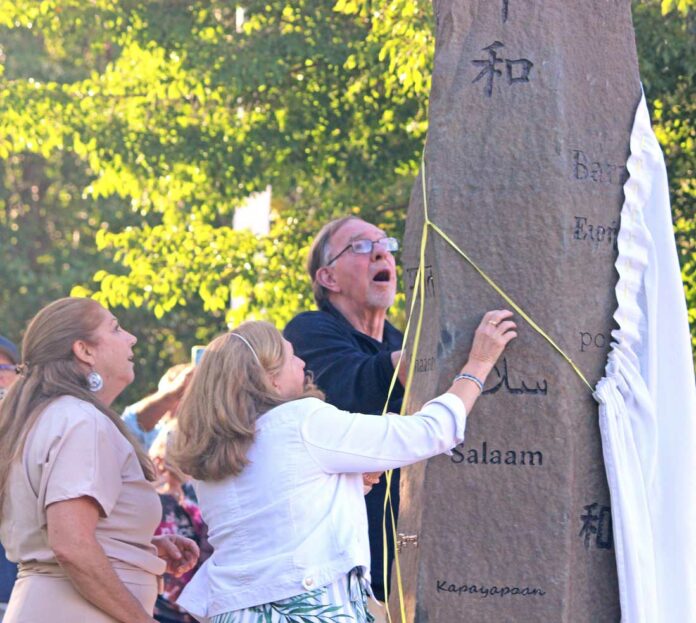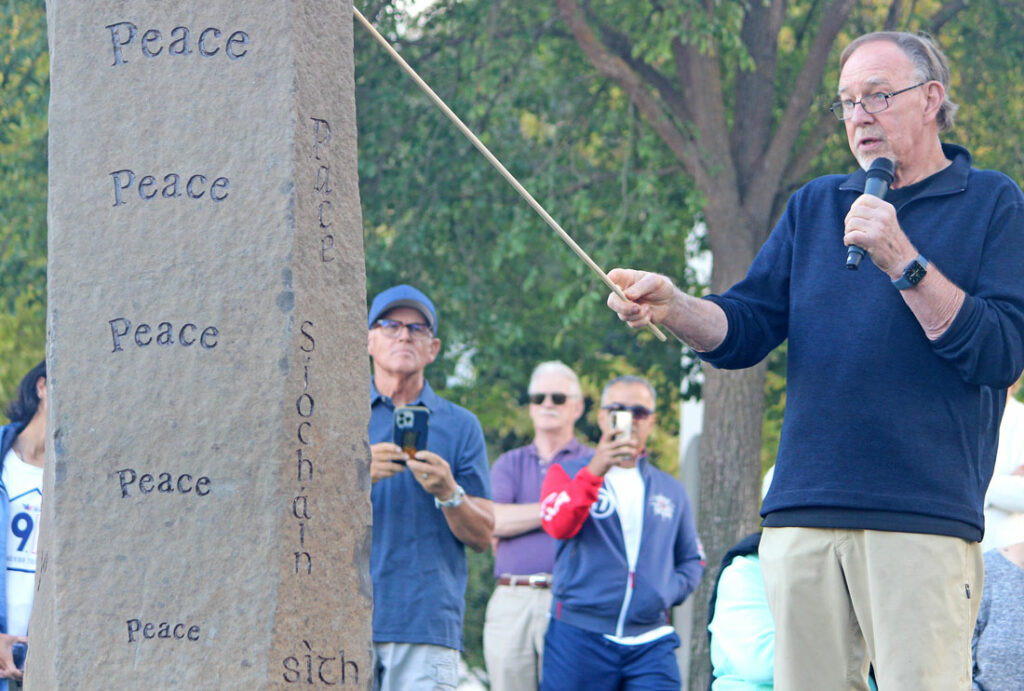
Marty Cheek has a plan to achieve global peace by Christmas Day in 2040.
He admits people will roll their eyes at this point, but he remains undeterred.
“It’s ambitious, it’s audacious, it’s also 100% doable,” he said.
Cheek, the publisher of Life Media Group, which produces the Morgan Hill Life and Gilroy Life newspapers, is heading up the Vision-2020 movement, which has a set of 20 goals he sees as necessary to create a world without wars.
To symbolize the launch of Vision-2020, Cheek teamed up with the Peace Project in unveiling a large sculpture at the Morgan Hill Civic Plaza on Sept. 21, which was World Peace Day as designated by the United Nations.
Cheek said Vision-2020 aims to use media technology in order to gather people together for a common good. Too often, he noted, platforms such as social media are used to divide people into “feuding tribes,” even though they have the power to educate and connect people from different cultures through storytelling.
He pointed to the Apollo moon landings in the 1960s and ‘70s as an example of people uniting through media, where countless people watched the historic moment on TV.
“I can’t think of any movement that would be greater than a movement to achieve global peace by Christmas Day 2040,” Cheek said.
And so, Cheek is now reaching out to various media outlets, hoping they will bite on what he sees as the “feel-good story of the century” and bring light to Vision-2020. In recent months, he has also been sending out a survey to elected officials, beginning in Santa Clara County, to see if they will publicly support the movement.
Cheek said he is worried about the future of the United States, as intense divisions are threatening the future of its democracy and pushing it closer to a civil war.
If at least 3.3 million Americans, or one percent of the population, actively support a global peace movement, it could serve as a model for the rest of the world, according to Cheek.
Morgan Hill sisters Janet Librers-Leach and Monica McClintock started the Peace Project more than a decade ago, with the goal of drawing people together to promote peace while installing a sculpture within the city as a reminder of the movement.
Librers-Leach said it was during this time that she was feeling depressed about the state of the world and the local region: the war in Afghanistan and the fatal shooting of 14-year-old Tara Romero in Morgan Hill, among other issues.
“We were looking for something good that would inspire others to live more peacefully, more united, more tolerant, bring people together of all cultures no matter what religion, what ideology, what gender, what orientation, or what race, against violence,” she said.
Librers-Leach visited a retreat center in Southern California, where she discovered a “peace pole” in a garden. Inspired by that visit, she said she wanted to create a similar place in Morgan Hill, where she has lived since 1963, and recruited her sister—“always my partner in crime”—in the endeavor.
She originally proposed a pole made of limestone, at a cost of $7,000, to the El Toro Culture and Arts Commission. Librers-Leach eventually connected with Los Gatos artist David Middlebrook, who is known for his large public art projects, and who came up with the design and the use of basalt for the monument.
“He totally understood we were going for durability and this columnar basalt column will last forever,” she said. “It is one of the hardest stones on earth. This particular stone is from the Jurassic Period and comes from the state of Washington.”
After years of fundraising, the $61,000 sculpture is now complete.
The nine-foot-tall basalt column features the word “Peace” carved in more than 25 languages. At the top of a sculpture sits a dove with an olive branch.
Three basalt benches also surround the artwork.

Middlebrook said when he was first approached about the project, it was originally intended to be a pole.
“All of these peace poles are too skinny,” he said. “It reminded me of going to a Giants game when there’s a flagpole in the way and you can’t see the plays. I think it’s more important than a pole, I think it should be a monument. It should represent time. It should represent civilizations past, present and future.”
Middlebrook said he chose basalt because it contains “the building blocks of life.”
“You can’t get any more inclusive of a material that represents life than basalt,” he said.
Librers-Leach said that “peace is about helping your neighbor, respecting all people regardless of their views, listening to others even if you don’t agree, taking steps to improve our environment and rejecting violence,” among other factors.
“Once we know people better, we realize we are more alike than we are different,” she said.
She also believes global peace by 2040 is possible, if people work toward it.
“It will take work by all of us including our world leaders, our governments on all levels, the media, churches, schools, service organizations, families and children,” Librers-Leach said. “Everyone needs to get on the same page. We can’t have peace if people are hungry, or homeless, or uneducated, fearful, or unsafe, or sick, or outside of the margins.”







